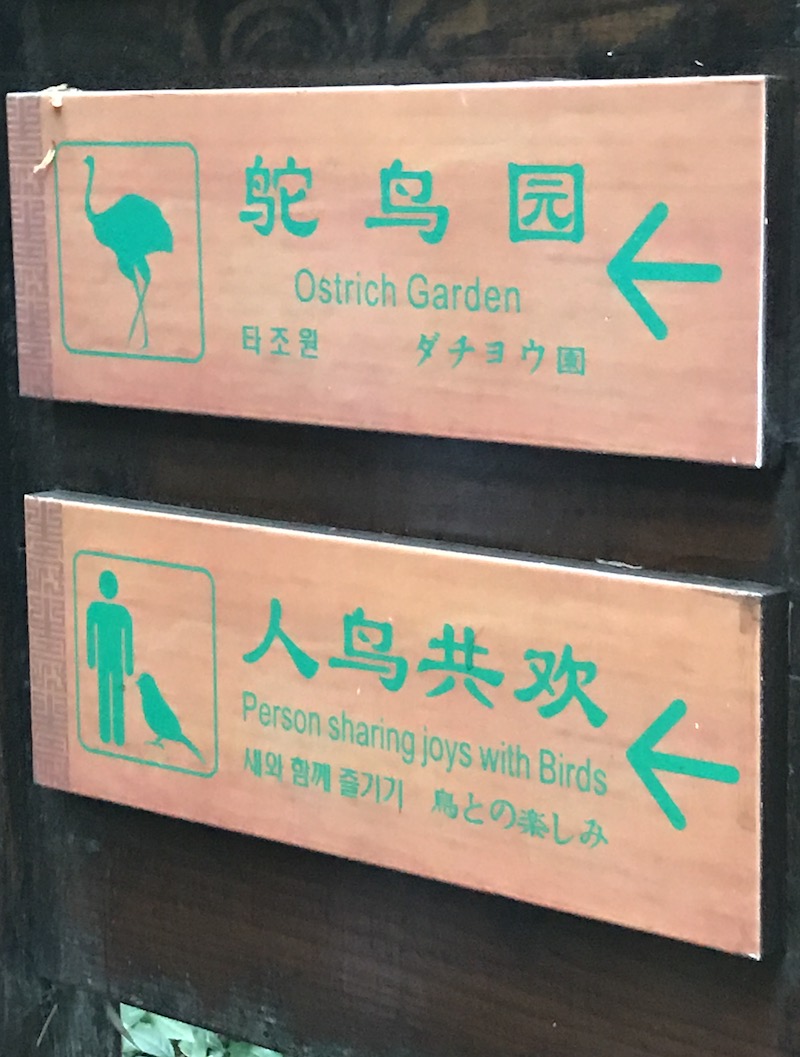Sharing joys with birds
« previous post | next post »
Vito Acosta sent in this photograph of a sign at Tianmu Lake ( Tiānmù hú 天目湖) in Jiangsu:
1.
Chinese: tuóniǎo yuán 鸵鸟园 ("ostrich garden")
Korean: tajoweon 타조원 ("ostrich garden")
I am not sure how you can have fun with ostriches!
From a person with ornithophobia
Haewon Cho
Japanese: dachō-en ダチョウ園 ("ostrich garden")
2.
rén niǎo gòng huān 人鸟共欢 ("people and birds happy together")
Korean: saewa hamkke jeulgigi 새와 함께 즐기기 (lit., "bird-with together enjoying", i.e., "enjoying with birds")
Japanese: tori to no tanoshimi 鳥との楽しみ ("our/your/my pleasure with birds") ("enjoyment with birds")
a.
The Chinese version is more objective, or the third person's view, whereas the Japanese one is more subjective, or human-centered view, I think.
Hiroko Sherry
b.
My guess is that it's not likely to be native Japanese, but also that it's not going to cause any ruffled feathers, either.
Nathan Hopson
The thought of sharing joys with feathered friends more than compensates for any slight infelicities of translation.

Jonathan Smith said,
November 8, 2019 @ 7:03 am
My question is why katakana in Japanese…
This also reminded me that taboo avoidance
/t/ > /n/ in 'bird' is not seen in SJ/SK… should /n/ be "reconstructed" to some common ancestor of Mandarin/Cantonese? Does Cant. have or has it ever had /t/ onset 'dick'? Hmm…
Benjamin E. Orsatti said,
November 8, 2019 @ 7:24 am
About the idiosyncratic capitalization: [Ostrich, Garden, Person, Birds], [sharing, joys, with]. I don't see the rhyme or reason to it. If the aim was "title case", then every word save "with" would be capitalized. If they were doing it "auf Deutsch", then "Joys" would also be capitalized.
Maybe the translator had in mind a distinction between concrete and non-physical nouns?
Benjamin E. Orsatti said,
November 8, 2019 @ 7:35 am
To Jonathan Smith:
Agree that katakana is weird here, but not Japanese L1, so not expert, but note deliberate avoidance of pronouns — doesn't that get some Japenese cred?
Jisho.org (https://jisho.org/search/ostrich) says that there is a word written in katakana — オストリッチ — but in the "Other forms" section of the entry on "駝鳥", it does list both だちょう and ダチョウ.
I wonder if Japanese has an equivalent term for "Chinglish". "中本語", maybe?
Chris Button said,
November 8, 2019 @ 1:00 pm
Actually I think katakana is pretty common for animal names. Many of the kanji for them aren't included in the joyo list so I suppose it helps with parsing. It could also be a hangover from the use of katakana for biological terms for species and the like.
Chris Button said,
November 8, 2019 @ 5:59 pm
@ Jonathan Smith
Has anyone ever proved that the t- ~ n- alternation is due to taboo? I wonder if there is more to it. I recall Bodman once suggested somewhere an earlier ⁿt- or some such thing.
Jonathan Smith said,
November 8, 2019 @ 7:00 pm
@Chris Button I don't know. But 'bird' 鳥 (phonetic in 島, etc.) has /t/ in rime books all the way through Menggu ziyun and /n/ only as of the more "Mandarin"-like Zhongyuan yinyun, I think… So taboo avoidance makes more sense than the idea of some odd proto-value, assuming Cant. is northern influenced…
Chris Button said,
November 8, 2019 @ 7:26 pm
True, although I wonder if we might have something like a 天 *tʰə́ɲ / 天 (祆) *ɬʲə́m situation?
Chris Button said,
November 8, 2019 @ 10:02 pm
Actually, I wonder if onomatopoeia might have played a role?
After all, we have 鳩 *kʰə̀w (compare "coo") and 隹 *tʷə̀l (which may have come from *tʷə̀r via the merger of *-r with *-l, and with which Laurent Sagart compares "turtur" from whence turtle dove).
Chris Button said,
November 9, 2019 @ 12:49 pm
There's also of course 雞 *káj from earlier *kjáɣ, which Schuessler notes as onomatopoeic too in his dictionary.